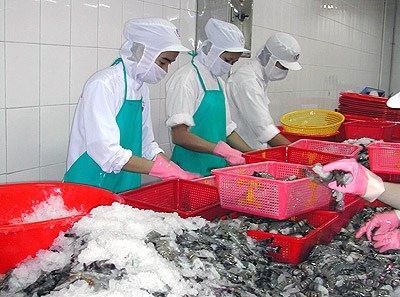Feedback strives to align draft tariff law with open trade climate
 Procesing aquatic products for exports (File photo. Source: VNS/VNA)
Procesing aquatic products for exports (File photo. Source: VNS/VNA)
A workshop was held in Hanoi on August 4 to collect opinions on the draft revised law on export and import duties, a move to align the nation’s regulations with the free trade environment Vietnam has promised its partner countries.
The draft law is scheduled to be submitted to the National Assembly for approval this October and take effect on July 1, 2016.
Vu Ngoc Anh, Deputy General Director of the General Department of Vietnam Customs, said it is time to overhaul the existing law, which took effect ten years ago and includes some regulations that are not in line with commitments made in existing or pending free trade agreements with partner nations.
Amendments should facilitate exports, especially goods with high added value, while curbing the shipment of raw material and appropriately protecting domestic products, he added.
Lo Thi Nhu, Director of the General Department’s Import – Export Duty Department, considered the extension of export tax payment deadlines for a number of prioritised companies as a fundamental reform. Accordingly, businesses could pay duties once a month and would not be subjected to guarantee fees or late payment penalties.
However, participants pointed out that only 35 of more than 50,000 importers and exporters are eligible for such priorities and they are considered compliant with legal regulations.
Almost all enterprises eligible for monthly payments are major firms, given one of the criteria for prioritised firms is a minimum trade turnover of 50 million - 200 million USD annually, an unrealistic target for small and medium companies, said Pham Thanh Binh – an expert of the Governance for Inclusive Growth Programme of the US Agency for International Development.
He noted businesses in some countries could pay duties 10 days after their goods are cleared instead of the pre-clearance payments currently implemented locally.
At the workshop, some opinions urged the long-term stability of revisions to minimise risks for enterprises. Others said some regulations in the draft law are still not in accordance with the International Convention on the Simplification and Harmonisation of Customs Procedures. The draft also fails to address many issues relating to tax exemptions and ways to encourage firms to comply with laws.-VNA













